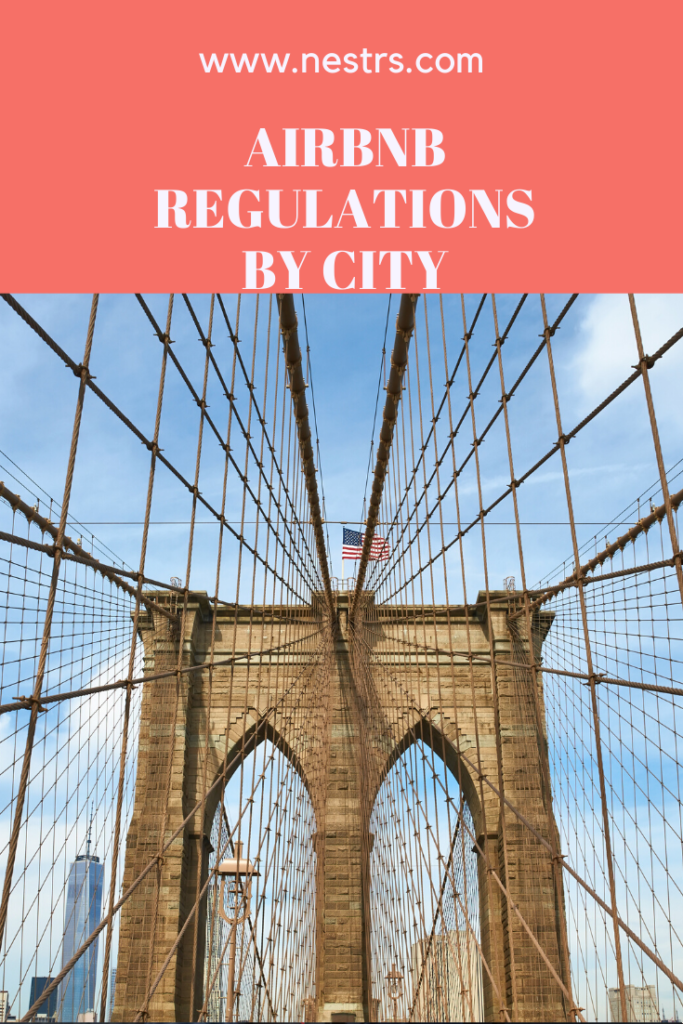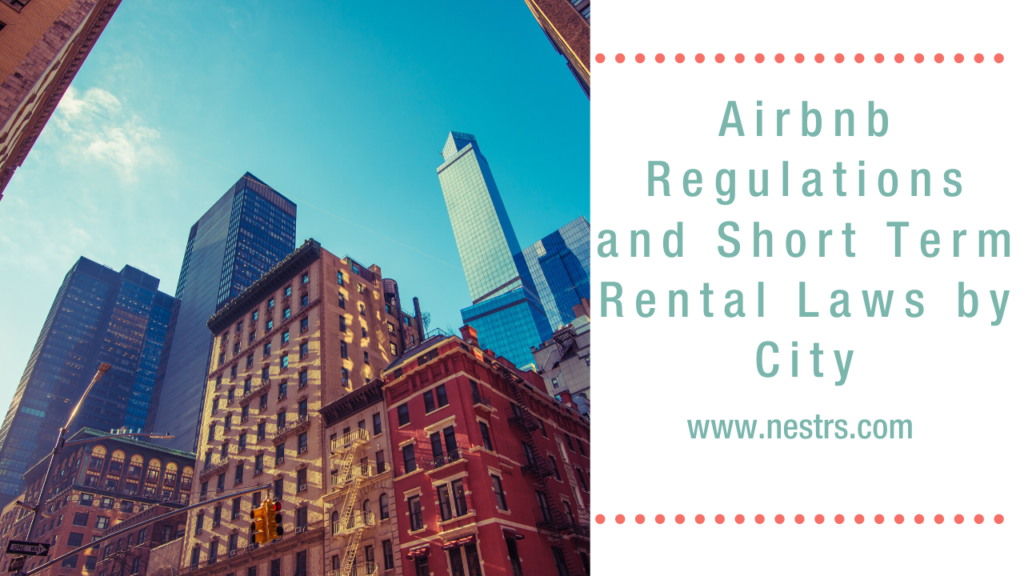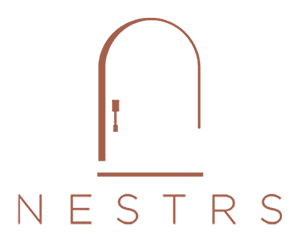01 Jun Airbnb Regulations and Short Term Rental Laws by City

The hospitality industry had long been set in its ways and had become comfortable with the consistent revenue.
Upon Airbnb’s launch in 2008, the platform sought to disrupt the market and give travelers a new way to experience the world.
That being said, other businesses and governments weren’t quite ready for the Short-Term Rental growth. Blanketed rules and regulations were passed quickly to quell uproar among communities over the fear of the unknown.
Over the years Airbnb and hosts around the world have worked hard to fight for fair regulations that benefit STR hosts and the cities that they operate in. Some cities have been more accepting than others.
What Do You Need to Know Before Opening Up Your Own Airbnb?
When thinking about opening up a Short-Term Rental or Airbnb or building out a business plan for it, checking your local municipal codes is a must! Apart from the financial requirements that you are responsible for, each city has very different regulations governing the running of short term rentals.
We have listed some of the most popular cities and their regulations. Even though your city may not be listed, it would be a good idea to browse through these to see just what some hosts have to go through in order to run their STR. Also, take a look at some of the ‘fines’ posted by each city.
New York City

Summary: New York City is one of the most popular tourist destinations on the east coast. You might be quick to think that this would be a great place to open up an Airbnb, but it’s regulations inherently limit the number of properties eligible.
Fun Fact: This is where we got our start on Airbnb! We started Hosting back in 2013 -before Airbnb was cool and before there were any sort of regulations. We turned a basement space that had its own bathroom and entrance into its own mini apartment studio. It not only paid for our mortgage but we also cash flowed. It’s what got us hooked! We’ve sine moved to the midwest, but we are grateful we had the opportunity to Airbnb in NYC. With their regulations today we would have still been able to Host -but, with these strict regulations it has cut down significantly on Hosts in the area.
Primary Regulations:
- You can’t rent out the entire apartment (hosts must be present)
- You are not able to advertise the apartment
- No more than 2 paying guests at a time.
Fines: $1,000 – $7,500 (illegal advertising of apartments)
STR License Fee: N/A
Additional Costs:
- Sales and Use Tax
- Hotel Room Occupancy Tax
San Francisco

Summary: Home to Airbnb HQ, San Francisco was one of the first cities to implement regulations surrounding STRs. You will find that the more popular cities, especially the ones that are landlocked, have some of the most strict stipulations for renting our properties.
Primary Regulations:
- Must register as a business and as a short term rental
- Hosts must be permanent residents
- Up to 90 nights a year without hosts
- No income-restricted affordable housing
Fines: ~ $484/(per day)
STR License Fee: $250
Additional Costs:
- Transient Occupancy Tax
- Business Personal Property Tax
Los Angeles

Summary: Los Angeles is a good example of regulations that may give a potential host pause when debating whether or not to open their home to guests. You are not able to register any investment properties as STRs and you can only rent your primary residence for a 120 days a year. This significantly changes your earning potential.
Primary Regulations:
- Must obtain licenses
- Must be primary residence
- Up to 120 days a year
Fines: ~ $500/(per day)
STR License Fee: $89
Additional Costs:
- Transient Occupancy Tax
Washington D.C.

Summary: If you thought LA restrictions were bad DC is even worse when considering a STR business. Washington D.C. has joined many of the country’s blanket rulings that state you can only rent out your primary residence and only for 90 days a year.
Primary Regulations:
- Must obtain license, additional “vacation rental” endorsement for renting out an entire unit
- Must be primary residence
- Up to 90 nights a year without hosts
Fines: $500- $6,500 (per violation)
STR License: N/A
Additional Costs:
- Transient Lodging Tax
Chicago

Summary: Chicago has proved to be a welcoming city for STRs. I’ve stayed their several times and you can tell the cities that embrace platforms such as Airbnb are much more enjoyable. Even as a guest, you can ‘feel’ the restrictions a city places on it’s hosts.
Primary Regulations:
- Short-term rental platforms must obtain license
- Hosts with 1 home-share unit register through the rental platform
- Up to 90 nights a year withouts hosts
Fines: $1,500 – $3,000 (per day)
STR License: $0 – $250
Additional Costs:
- Hotel Accommodation Tax
Boston

Summary: Hosts can only rent out their space for 28 days a year or less! Is that even worth it? For some this may still seem sensible. The average American gets 2 weeks of paid vacation and some see this as an opportunity to rent out their homes while they are gone and help pay for that vacation each year.
Primary Regulations:
- Must obtain license
- Must be primary residence or an secondary unit at their primary residence
- No income-restricted units
Fines: $100 – $300 (per day)
STR License: $25 – $200
Additional Costs:
- Same Tax as Hotel
Seattle

Summary: Seattle is another great place to have an Airbnb. The city’s restrictions are fair and don’t limit the number of nights you can rent out your space. Also you are able to rent out up to 2 properties, as long as one is your primary residence.
Primary Regulations:
- Short-term rental platforms must obtain license
- Hosts must register as a business and as a short-term rental
- Up to 2 units
- If operating 2 unites, one must be primary residence
Fines: $500 – $1,000 (per violation)
STR License: $75
Additional Costs:
- Retail Sales Tax
- Lodging Tax
- Business and Occupation Tax
Las Vegas

Summary: With a thriving hotel industry it’s no surprise that the city makes it hard for hosts to turn a profit and for guests to feel relaxed. Being limited to less than 31 days of bookings it takes a special host to want to run a quality STR in Vegas. I’ve stayed here twice and had great experiences, but it was a little strange. We used the room we rented more or less as a glorified airport lounge that had a shower and a bed. It was to have a quick shower and nap before our flight back home.
Primary Regulations:
- Las Vegas allows some homes to be rented out for less than 31 days, but with many limitations. Only property owners are eligible to operate a short-term rental, and they have to be present while the property is being rented out.
- A property has to be at least 660 feet from any other short-term residential rental, can’t have more than 3 bedrooms, and can’t be located in master-planned areas such as Summerlin and Symphony Park.
- In order to obtain a short-term rental license, the property owner has to provide proof of liability insurance coverage with a $500,000 minimum amount.
- With a valid license, the host can’t host more than two persons per bedroom.
Austin

Summary: The city of Austin has erected regulations around STRs in a very different way than most. From what you can gather in cities such as these, there are still opportunities for hosts to fight for more freedom. The legislation has been written as a delayed constriction for STRs, which seemingly indicates willingness for amendments.
Primary Regulations:
The city categorizes 3 types of STR:
- Type 1: Owner-Occupied (single-family, multifamily or duplex)
- Type 2: Not Owner-Occupied (single-family or duplex)
- Type 3: Not Owner-Occupied (multifamily)
- The ordinance prohibits unlicensed short-term rentals from advertising.
Fines: Upt $2,500 (per day)
STR License: N/A
Additional Costs: N/A
Miami

[chart with summary, fine, STR licensing fee, and additional costs for just this city – like the one found here]
100-150 words
Summary: With Miami being warm all year round, the regulation requiring the primary resident to live there 6 months out of the year doesn’t seem so bad. If you have the option to spend the other half of the year elsewhere, then this is a unique niche to take advantage of.
Primary Regulations:
- A vacation home must live in the same unit for more than six months a year
- The maximum overnight occupancy for vacation rentals is up to a maximum of 2 persons per bedroom, plus 2 additional persons per property, up to a maximum of 12 persons.
- The unit must be licensed by the State of Florida, including registration with the Florida Department of Revenue for tax purposes. The unit has to pass a property inspection to get the license as a vacation rental, which is valid for one year.
Fines: $100 for the 1st offense | , $1,000 for the 2nd | $2,500 for the 3rd
STR License: N/A
Additional Costs: N/A
Conclusion
If you are considering renting out your home, a room, or an investment property your first step has to be looking into your city’s municipal codes. These will quickly determine whether or not you or your property are even going to be eligible. If you are eligible then the question quickly becomes, “Are the restrictions, taxes, and potential earnings worth it?” There is definitely room for niche Airbnbs all over the world, but city regulations will make each operate and feel very differently.
(featured image)


No Comments